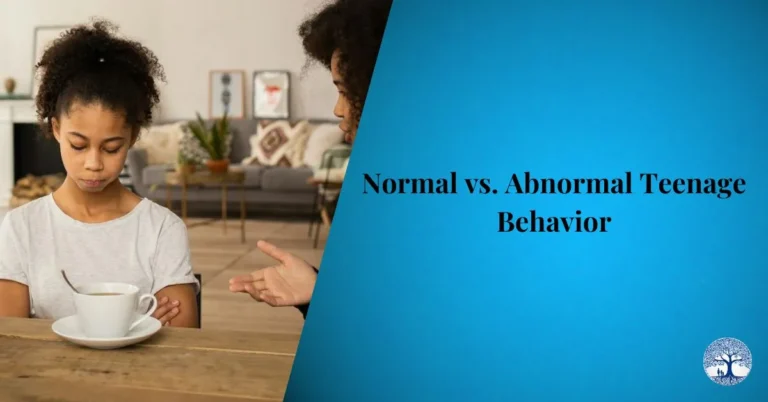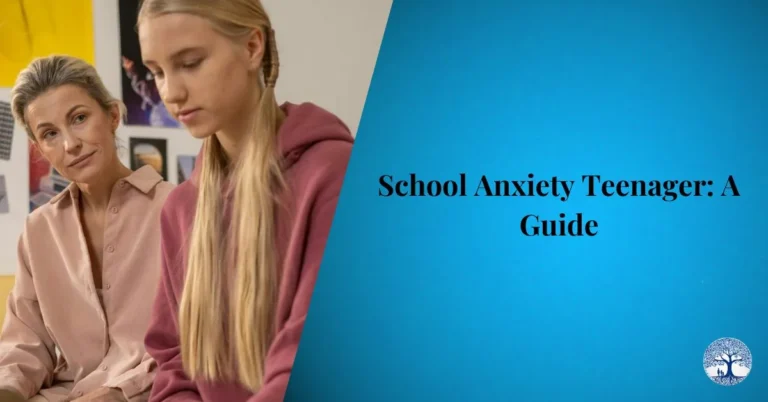Introduction
Supporting your teenage daughter’s mental health is more important now than ever. Adolescence is a challenging time filled with emotional and physical changes, and teenage girls, in particular, can face unique pressures that affect their well-being. From academic stress and social media influences to body image concerns and peer relationships, these challenges can take a significant toll on their mental health. Recognizing the signs of these struggles early on and fostering an environment where your daughter feels safe to express her emotions can make a world of difference. By understanding the specific mental health challenges teenage girls often face, parents can play a crucial role in guiding them through these formative years with compassion and support.
Understanding Teenage Mental Health
What Is Teenage Mental Health?
Teenage mental health encompasses the emotional, psychological, and social well-being of adolescents. It affects how they think, feel, and behave as they navigate the complexities of adolescence. During the teenage years, mental health plays a crucial role in shaping a young person’s self-esteem, relationships, and overall quality of life. For teenage girls, mental health can be influenced by hormonal changes, social dynamics, and societal expectations, making it essential for parents and caregivers to understand these unique challenges.
Common Mental Health Issues Among Teenage Girls
Adolescence can be a tumultuous time, and teenage girls often face a variety of mental health challenges that can impact their daily lives. Some of the most common issues include:
- Anxiety: Many teenage girls experience anxiety, which can manifest as excessive worry, nervousness, or fear about school, social situations, or their future. Anxiety can interfere with their ability to concentrate, participate in activities, or enjoy life.
- Depression: Depression is another prevalent mental health issue among teenage girls. It can present as persistent sadness, loss of interest in previously enjoyed activities, feelings of hopelessness, or changes in sleep and appetite. Recognizing the signs of depression early can help in seeking timely professional support.
- Body Image Issues: Teenage girls often face significant pressure regarding their appearance, which can lead to body image issues. This concern may stem from societal standards, social media influence, or peer comparisons, and can contribute to low self-esteem, eating disorders, and other related mental health problems.
- Stress: The pressures of academic performance, extracurricular activities, and social dynamics can cause substantial stress for teenage girls. Chronic stress can negatively affect both their physical and mental health, leading to burnout and other health problems if not managed properly.
Signs Your Teenage Daughter May Be Struggling
Recognizing the signs of mental health struggles in your teenage daughter is essential to provide timely support. Here are some common indicators to watch for:
- Changes in Mood: Frequent mood swings, irritability, or an unusually quiet demeanor may signal emotional distress.
- Withdrawal from Friends and Activities: A noticeable lack of interest in socializing or in activities she once enjoyed could indicate underlying issues.
- Changes in Eating or Sleeping Habits: Sudden changes in appetite or sleep patterns, such as insomnia or oversleeping, can be signs of mental health concerns.
- Decline in Academic Performance: A drop in grades or a lack of interest in schoolwork might suggest that she is struggling emotionally.
- Expressions of Hopelessness or Worthlessness: Pay attention to negative self-talk or statements that reflect a lack of hope or self-worth, as these could be red flags for depression or anxiety.
Understanding these aspects of teenage mental health is the first step in offering the right support and ensuring your daughter feels understood, loved, and valued during this critical phase of her life.

Building a Supportive Environment
Open Communication
Creating an environment where your teenage daughter feels comfortable expressing her feelings is key to supporting her mental health. Open communication begins with being approachable and showing genuine interest in her daily life. Make it a habit to engage in regular conversations, asking open-ended questions that allow her to share her thoughts and emotions freely. It is important to avoid interrupting or rushing her when she is speaking, as this can make her feel unheard or dismissed. Instead, offer a listening ear and reassure her that you are there to support her, no matter what she is going through.
Active Listening
Active listening is a powerful tool in building a supportive environment for your teenage daughter. It involves fully focusing on what she is saying, understanding her perspective, and responding thoughtfully. When your daughter shares her feelings, practice empathy by putting yourself in her shoes and acknowledging her emotions without judgment. Phrases like “I understand why you feel that way” or “It sounds like you’re going through a tough time” can help validate her feelings and show that you are genuinely trying to understand her experience. Avoid offering unsolicited advice or solutions unless she specifically asks for them, as this can sometimes feel dismissive. Instead, ask her how you can best support her and let her guide the conversation.
Creating a Safe Space
A supportive and non-judgmental home environment is essential for fostering open communication and helping your teenage daughter feel safe to express herself. This means creating a space where she feels respected, valued, and understood, regardless of her thoughts, feelings, or experiences. Encourage a culture of openness and honesty in your household, where everyone’s emotions are acknowledged and respected. Avoid harsh criticism or punitive responses to her mistakes, as these can shut down communication and make her less likely to share in the future.
Instead, focus on positive reinforcement and constructive feedback, emphasizing growth and learning. By cultivating a home environment that is nurturing and accepting, you can help your daughter feel secure in being herself, which is crucial for her mental and emotional well-being.
Promoting Healthy Lifestyle Choices
Encouraging Physical Activity
Physical activity plays a vital role in maintaining both physical and mental health, especially for teenagers. Regular exercise helps reduce symptoms of anxiety and depression by releasing endorphins, which are natural mood lifters. Encouraging your teenage daughter to engage in physical activities she enjoys—whether it’s dancing, swimming, cycling, or joining a sports team—can make exercise a fun and rewarding part of her routine. It’s also a great way for her to relieve stress, boost her self-esteem, and improve her overall mood. Aim for at least 30 minutes of moderate physical activity most days of the week to help support her mental and emotional well-being.
Balanced Diet and Nutrition
A balanced diet is another crucial aspect of promoting your daughter’s mental health. What she eats can significantly influence her mood, energy levels, and cognitive function. Encourage a diet rich in whole foods, such as fruits, vegetables, whole grains, lean proteins, and healthy fats. These foods provide essential nutrients that support brain health and help regulate mood. For instance, omega-3 fatty acids found in fish, nuts, and seeds are known to have a positive impact on mental health. Additionally, reducing the intake of processed foods, sugary snacks, and caffeine can help stabilize blood sugar levels and prevent mood swings. By fostering healthy eating habits, you can help your daughter feel more balanced and energized throughout her day.
Adequate Sleep
Adequate sleep is fundamental to your daughter’s mental health and overall well-being. Teenagers need about 8 to 10 hours of sleep each night to function optimally, both physically and mentally. Lack of sleep can lead to increased irritability, difficulty concentrating, and heightened stress levels, which can negatively affect her mood and academic performance. To promote better sleep habits, encourage a consistent sleep schedule by setting regular bedtimes and wake-up times, even on weekends. Creating a relaxing bedtime routine, such as reading a book or practicing mindfulness, can also help signal to her body that it’s time to wind down.
Reducing screen time before bed is another effective way to improve sleep quality, as the blue light emitted by screens can disrupt the production of melatonin, the hormone responsible for regulating sleep. By prioritizing healthy sleep habits, you can help your daughter maintain her mental and emotional health.

Educating on Mental Health
Understanding Mental Health Issues
Educating your teenage daughter about mental health is an important step in empowering her to understand her emotions and experiences. By providing access to reliable resources and information, you can help her recognize and articulate her feelings, making it easier for her to seek support when needed. Consider introducing her to age-appropriate books, articles, or reputable websites that cover topics like anxiety, depression, and stress in a way that is easy to understand. Encourage her to ask questions and explore these topics openly, which can foster a deeper understanding of her mental health and reduce feelings of isolation. Additionally, discussing the benefits of therapy or counseling can help normalize these resources as valuable tools for maintaining mental well-being.
Reducing Stigma
Reducing the stigma around mental health is crucial in creating a supportive environment for your daughter. Openly discussing mental health within the family can help demystify these topics and encourage your daughter to speak up about her own experiences. Start by modeling vulnerability and sharing your own feelings or challenges when appropriate, which can demonstrate that it’s okay to talk about emotions and seek help.
Use inclusive language that avoids judgment and focuses on understanding, such as “It’s okay to feel this way” or “Everyone struggles sometimes.” Encourage family members to express empathy and offer support rather than criticism when discussing mental health issues. By creating a culture of acceptance and open dialogue, you can help reduce the stigma associated with mental health, making it easier for your daughter to reach out for support when she needs it.
Seeking Professional Help
When to Consider Therapy
Recognizing when your teenage daughter may need professional help is crucial in addressing her mental health needs. Therapy can be a valuable resource if she shows signs of persistent sadness, withdrawal from social activities, drastic changes in behavior, or expresses feelings of hopelessness. Other indicators that therapy might be necessary include significant changes in eating or sleeping patterns, a decline in academic performance, or engaging in risky behaviors.
If these signs persist for more than a few weeks and begin to affect her daily life, it might be time to consider seeking professional support. Finding a qualified therapist who specializes in adolescent mental health can make a significant difference. Start by consulting your family doctor for referrals or using trusted online directories to find licensed mental health professionals in your area.
Types of Mental Health Professionals
There are various types of mental health professionals who can help your daughter, each with specific expertise and roles. Psychologists are trained to assess, diagnose, and provide therapy for a wide range of mental health issues through evidence-based practices like cognitive-behavioral therapy (CBT). Psychiatrists are medical doctors who specialize in diagnosing and treating mental health disorders, often focusing on medication management in conjunction with therapy.
Licensed Clinical Social Workers (LCSWs) and Licensed Professional Counselors (LPCs) provide therapeutic services and can support your daughter with coping strategies, emotional regulation, and life skills. School counselors may also be a valuable resource for addressing academic-related stress and providing initial support or referrals. Understanding the different types of mental health professionals can help you choose the right support for your daughter’s needs.
Supporting Your Daughter Through Therapy
Supporting your daughter if she starts therapy is vital to ensure she feels comfortable and supported throughout the process. Begin by normalizing therapy as a positive step towards well-being, emphasizing that seeking help is a sign of strength, not weakness. Encourage her to communicate openly about her experiences in therapy, but respect her privacy if she prefers not to share everything. You can also support her by helping with practical arrangements, such as scheduling appointments or providing transportation.
Being patient and understanding, especially during times when she may feel resistant or discouraged, is important. Reassure her that progress in therapy can take time and that you are there to support her every step of the way. Creating a trusting environment where she feels safe discussing her thoughts and feelings will help reinforce the positive impact of therapy on her mental health journey.
Encouraging Healthy Coping Mechanisms
Identifying Unhealthy Coping Mechanisms
Helping your teenage daughter identify and understand unhealthy coping mechanisms is a critical step in supporting her mental health. Unhealthy behaviors, such as excessive screen time, substance use, self-harm, or withdrawal from social interactions, are often used as temporary escapes from emotional pain or stress. These behaviors can worsen her mental health over time and hinder her ability to develop positive coping skills. It’s important to address these behaviors with empathy and without judgment.
Start by having an open and honest conversation about your observations, expressing concern rather than criticism. Encourage her to reflect on how these behaviors impact her well-being and discuss healthier alternatives. Offering support and understanding can help her feel safe in acknowledging these patterns and motivated to make positive changes.
Teaching Stress-Relief Techniques
Teaching your daughter healthy coping mechanisms, such as mindfulness, meditation, and deep breathing exercises, can provide her with effective tools to manage stress and anxiety. Mindfulness involves focusing on the present moment and accepting it without judgment, which can help reduce anxiety and improve emotional regulation. Simple mindfulness exercises, like focusing on her breath or practicing mindful eating, can be easily incorporated into her daily routine. Meditation is another powerful tool that can help calm the mind and reduce stress.
Encourage her to start with just a few minutes each day, using guided meditation apps or videos that are specifically designed for beginners. Deep breathing exercises are also highly effective for managing stress. Techniques like diaphragmatic breathing or the 4-7-8 breathing method can help activate the body’s relaxation response, making it easier for her to cope with challenging situations. Teaching these techniques and encouraging regular practice can empower your daughter to handle stress in a healthy and constructive way.

Being a Positive Role Model
Modeling Healthy Behavior
As a parent, your behavior can significantly influence your teenage daughter’s mental health and how she manages her own emotions. Modeling healthy behavior is one of the most effective ways to encourage positive habits in your daughter. This means demonstrating effective stress management techniques, maintaining a balanced lifestyle, and prioritizing your own mental well-being.
For instance, openly practicing self-care, engaging in regular physical activity, and maintaining healthy eating and sleep habits can show her the importance of looking after her mental and physical health. Additionally, handling your own emotions constructively, such as discussing feelings openly or seeking support when needed, can set a powerful example for your daughter. By modeling these behaviors, you are not only teaching her valuable life skills but also creating a supportive environment where mental health is prioritized and respected.
Sharing Your Own Experiences
Sharing your own experiences with mental health can be a valuable way to foster open communication and normalize discussions about emotions and well-being. When you talk openly about your challenges, whether related to stress, anxiety, or other issues, you show your daughter that it is okay to have struggles and that seeking help or talking about them is a healthy response. Sharing personal stories can help demystify mental health and make it easier for her to relate and open up about her own experiences.
It is important to ensure that your sharing is age-appropriate and focuses on the positive steps you took to manage your mental health, such as practicing self-care, seeking therapy, or talking to trusted friends or family members. By doing so, you can build a trusting relationship with your daughter and create a safe space for her to express her feelings without fear of judgment or stigma.
Building a Strong Support Network
Encouraging Peer Support
Healthy friendships and peer support play a vital role in your teenage daughter’s mental health. Positive relationships with friends can provide emotional support, enhance self-esteem, and offer a sense of belonging. Encourage your daughter to build and maintain friendships with peers who uplift and support her. Engage in conversations about what makes a good friend and how to cultivate healthy relationships. Be proactive in creating opportunities for her to connect with peers, such as organizing group activities or encouraging participation in clubs and sports where she can meet like-minded individuals. By fostering a supportive peer network, you help her develop resilience and a sense of community, which can be invaluable during challenging times.
Family Involvement
Family involvement is crucial in supporting your daughter’s mental health. Each family member can play a role in creating a nurturing environment. Encourage siblings to show understanding and offer support, which can help strengthen family bonds and provide a safety net for your daughter. Family activities, such as regular family dinners or game nights, can promote a sense of togetherness and open lines of communication. Additionally, educating extended family members about your daughter’s mental health needs can help them provide informed support and avoid misunderstandings. By fostering a unified family approach, you create a consistent support system that reinforces your daughter’s well-being.
Community Resources
Local community resources can offer valuable support and additional avenues for your daughter’s mental health. Explore community centers, support groups, or local nonprofits that offer programs or workshops on mental health, stress management, or social skills. Many communities provide access to counseling services, peer support groups, and educational workshops designed for teenagers. Encourage your daughter to participate in these resources if she feels comfortable, as they can provide additional support and connect her with others who may be facing similar challenges. Utilizing community resources not only offers professional guidance but also helps her build connections outside the family, contributing to a well-rounded support network.
Conclusion
In summary, supporting your teenage daughter’s mental health involves creating an open and supportive environment, encouraging healthy lifestyle choices, and educating her about mental health issues. By fostering open communication, modeling positive behaviors, and seeking professional help when necessary, you can play a pivotal role in her emotional well-being. Encouraging her to engage in healthy coping mechanisms and build a strong support network with peers, family, and community resources will further enhance her mental health. Prioritizing these aspects is crucial for her overall development and happiness. If you found this information helpful, please share this post with others who might benefit from these insights, and consider taking proactive steps to support the mental health of the teenagers in your life.
Check out our blog Responsibilities Of Adolescents: A Guide, for more such content!
Frequently Asked Questions (FAQs)
1. What are the signs that my teenage daughter may be struggling with her mental health?
Recognizing the signs that your teenage daughter may be struggling with her mental health is crucial for providing timely support. Common indicators include persistent sadness or irritability, withdrawal from social activities, significant changes in eating or sleeping patterns, and a noticeable decline in academic performance. Other signs may include excessive worry or anxiety, expressions of hopelessness, and engaging in risky behaviors. If you notice these signs, it’s important to open a dialogue with her and consider seeking professional help if the issues persist.
2. How can I encourage my daughter to talk about her feelings?
Encouraging your daughter to share her feelings starts with creating a safe and non-judgmental environment. Show genuine interest in her life and emotions by engaging in regular, open-ended conversations. Avoid interrupting or offering unsolicited advice; instead, listen actively and empathetically. Let her know that her feelings are valid and that you are there to support her. Setting aside dedicated time for one-on-one conversations can also help her feel more comfortable opening up.
3. What are some healthy coping mechanisms I can encourage my daughter to use?
Healthy coping mechanisms include mindfulness, meditation, and physical activity. Encourage your daughter to practice mindfulness exercises, such as focusing on her breath or engaging in mindful activities like journaling. Meditation apps and videos can help her get started with meditation. Additionally, regular physical activity, such as walking, dancing, or playing sports, can significantly reduce stress and improve her mood. Teaching her these techniques can provide her with effective tools to manage her emotions constructively.
4. When should I consider seeking professional help for my daughter?
Consider seeking professional help if your daughter shows persistent signs of emotional distress, such as ongoing sadness, severe anxiety, or significant behavioral changes that impact her daily life. If her struggles interfere with her ability to function at school, in social settings, or at home, it may be time to consult a mental health professional. Early intervention can be key in addressing mental health issues effectively, so don’t hesitate to seek help if you have concerns.
5. How can I support my daughter if she starts therapy?
Supporting your daughter during therapy involves showing understanding and encouragement. Normalize therapy as a positive and proactive step towards better mental health. Respect her privacy by allowing her to share her therapy experiences on her own terms. Help with logistical aspects, such as transportation and scheduling, to ensure she can attend her sessions regularly. Be patient and provide reassurance that progress takes time, and offer emotional support throughout her therapy journey.





